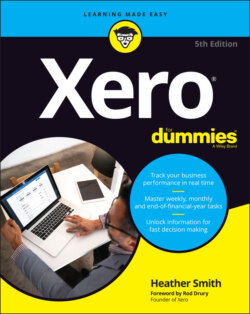Читать книгу Xero For Dummies - Heather Smith - Страница 17
Understanding Your Team’s Needs
Оглавление‘Avast belay, yo ho, heave ho, A-pirating we go, And if we’re parted by a shot, We’re sure to meet below!’ … and that was my one line in the Singaporean pantomime production of Peter Pan. In the theatre, everyone in the crew has a defined role, yet each role is interdependent on the other players. If the lighting guy had missed his cue, we would have been in darkness; if the sound guy flicked the wrong switch, we might not have been able to hear; and if I had forgotten my one line — well, the audience may well have wanted their money back! We supported each other, we improvised and we covered each other’s backs, for the greater good of the production and the audience’s enjoyment.
Xero is an innovative and time-saving product — but it doesn’t work on its own. If you set up and activate all your business bank accounts and maybe set up a few coding rules (see Chapter 4), you can save yourself a lot of time. But don’t think you can then ignore Xero and return in 12 months’ time to find everything done for you! If you try this approach, what you’re likely to have is lots and lots of pieces of a puzzle, waiting to be reviewed, coded and reconciled.
The Xero file needs to be processed on a regular basis, with reports prepared, taxes submitted, and data analysed to help with informed business decisions. Ideally, you need to establish a supportive Xero advisory team that’s focused on helping your business achieve its goals. The collaborative and transparent nature of Xero lends itself to working with this team of specialists, who in their own way support each other and your business. Your team might include:
Accountants: Your accountant works from the top of your business down, looking at the overall business. Just like you can go to different types of doctors, you can also access different types of accountants for the health of your business:Tax accountants assist businesses in meeting compliance obligations, preparing financial statements and preparing tax strategies. Tax accountants can review reports and provide rolling tax advice during the year. They can maintain the Fixed Asset Register and prepare depreciation schedules from within the accounts. Tax accountants can enter the end of financial year journals directly into Xero’s single ledger and confirm that your financial reports from Xero match your prepared financial reports.Management accountants assist businesses with strategic planning, business growth, cash flow budgeting and financial analysis. Management accountants assist in developing a useful chart of accounts — customising report layouts so information is presented in an informative manner — and issue monthly management reports. Using visuals, words and numbers, a management accountant can help you understand how the business is tracking and what can be done to improve it.
Bookkeepers: These experts clean the data working from the bottom of businesses up, entrenched in the detail, assisting with data collection, reconciling reports, and following up with accounts payable and accounts receivable, and payroll management and reporting. Bookkeepers can identify complicated transactions, such as a fixed asset purchase, and flag them for the tax accountant to review and approve.Your bookkeeper may assist with the preparation of consumer tax reporting where relevant.
Xero partner: Investing in up-front support from a Xero implementation specialist gets you started faster and ensures you’re heading in the correct direction. You may work with a few different Xero experts:Advisers gather your business data and help you efficiently and effectively set up your Xero data file. They also provide ongoing support and guidance on how to use Xero.Cloud integrators are able to suggest and install various add-on solutions that can benefit your business, and they provide you with ongoing IT support.Trainers instruct you in using Xero within your business environment.
Collaboration and communication are the keys to success. You and your team need to clearly communicate with each other, maintain open relationships and respect each other, and you each need to understand the interdependent nature of each other’s role. Avoid having people on your team who are always ready to lay the blame on other parties — it’s unproductive and drains resources. Working at the coal face of small business, I’m sometimes concerned by the animosity and disrespect some people show one another.
Here’s how each member of your team can use Xero to get along:
The management accountant asks the bookkeeper to code all transactions in Xero related to a particular project to a specified tracking option (see Chapter 12 for more on tracking).
The bookkeeper uses Xero’s Discuss feature to ask the tax accountant for advice on how to code the purchase of computers (see Chapter 8 for more on the Discuss tab and Chapter 14 for more on fixed assets).
The tax accountant advises all users of your Xero file to code any cost relating to entertainment to the entertainment expense code — clearly detailing what it was for and who was in attendance — so she can review expenses at the end of the period (see Chapter 11).
The Xero implementation specialist provides training to all users to show them how to effectively and efficiently use Xero!
For many start-ups and micro businesses, the ‘team’ could be one person wearing several hats — that is, the business owner may play many of the roles mentioned in the preceding paragraphs and, indeed, the roles can overlap (even if performed by different people). Or you may need a few people in your team to suit the nature of your business. Working with a team of specialists provides you with leverage and a depth of knowledge in the business that can facilitate business growth.
